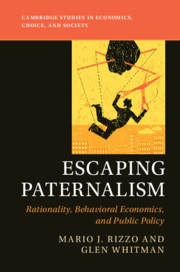Book contents
- Escaping Paternalism
- Cambridge Studies in Economics, Choice, and Society
- Escaping Paternalism
- Copyright page
- Contents
- Figures
- Tables
- Preface
- 1 Introduction
- 2 What Is Rationality?
- 3 Rationality for Puppets
- 4 Preference Biases
- 5 The Rationality of Beliefs
- 6 Deficient Foundations for Behavioral Policymaking
- 7 Knowledge Problems in Paternalist Policymaking
- 8 The Political Economy of Paternalist Policymaking
- 9 Slippery Slopes in Paternalist Policymaking
- 10 Common Threads, Escape Routes, and Paths Forward
- References
- Index
5 - The Rationality of Beliefs
Published online by Cambridge University Press: 02 December 2019
- Escaping Paternalism
- Cambridge Studies in Economics, Choice, and Society
- Escaping Paternalism
- Copyright page
- Contents
- Figures
- Tables
- Preface
- 1 Introduction
- 2 What Is Rationality?
- 3 Rationality for Puppets
- 4 Preference Biases
- 5 The Rationality of Beliefs
- 6 Deficient Foundations for Behavioral Policymaking
- 7 Knowledge Problems in Paternalist Policymaking
- 8 The Political Economy of Paternalist Policymaking
- 9 Slippery Slopes in Paternalist Policymaking
- 10 Common Threads, Escape Routes, and Paths Forward
- References
- Index
Summary
Rational beliefs need not be truth-tracking nor adhere strictly to basic logical or statistical-inference principles. They must simply be appropriate to the attainment of the individual’s purposes in specific contexts. We analyze various “errors” that behavioral economists have supposedly discovered in belief formation. Specifically, we examine supposed errors related to imperfect logical deduction, the conjunction fallacy (including the famous “Linda problem”), availability bias, overconfidence bias, and distorted salience. In each case we show that the standard behavioral analysis is too simple and that many of their behaviors qualify as inclusively rational. The fundamental error of behavioral analysts is to expect that universal, abstract methods of belief formation will be appropriate for guiding all concrete choices.
Keywords
- Type
- Chapter
- Information
- Escaping PaternalismRationality, Behavioral Economics, and Public Policy, pp. 119 - 189Publisher: Cambridge University PressPrint publication year: 2019

